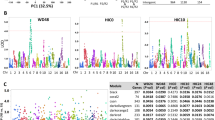Abstract.
C57BL/6J (B6) inbred mice are well known to drink large amounts of alcohol (ethanol) voluntarily and to have only modest ethanol-induced withdrawal under fixed dose conditions. In contrast, DBA/2J (D2) mice are ``teetotallers'' and exhibit severe ethanol withdrawal. Speculation that an inverse genetic relationship existed between these two traits was substantiated by meta-analysis of existing data collected in multiple genetic models, including large panels of standard and recombinant inbred strains, their crosses, and selectively bred mouse lines. Despite methodological differences among laboratories in measurement of both preference drinking and withdrawal, a nearly universal finding was that genotypes consuming large amounts of 10% ethanol (calculated as g/kg/day) during two-bottle choice preference drinking were genetically predisposed to low withdrawal scores in independent studies after either acute or chronic ethanol treatment. Conversely, low-drinking genotypes had higher withdrawal severity scores. The genetic relationship appears to be strongest in populations derived from B6 and D2, where data from more genotypes (BXD RIs, B6D2F2s, BXD RI F1s, and B6D2F2-derived selectively bred lines) were available for analysis. Gene mapping studies in these populations identified four chromosome regions [on Chromosomes (Chrs) 1, 2, 4, and 15] where genes might potentially influence both traits. Among genotypes with greater genetic diversity (for example, a panel of standard inbred strains or selectively bred lines), the relationship was less pronounced. Thus, reduced susceptibility to the development of high alcohol use may be supported by increased genetic susceptibility to ethanol withdrawal symptoms.
Similar content being viewed by others
Author information
Authors and Affiliations
Additional information
Received: 15 September 1998 / Accepted: 8 October 1998
Rights and permissions
About this article
Cite this article
Metten, P., Phillips, T., Crabbe, J. et al. High genetic susceptibility to ethanol withdrawal predicts low ethanol consumption. 9, 983–990 (1998). https://doi.org/10.1007/s003359900911
Issue Date:
DOI: https://doi.org/10.1007/s003359900911




